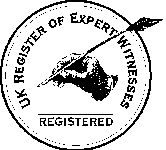Counterfeit Credit Cards
This is one of the few cases where an expert witness can do nothing that will help the defence.
Police seized material from the home of the Defendant, Mr D, that included:
- A device for reading the magnetic stripe on plastic cards.
- A device for reading and writing the memory chip on modern plastic cards.
- A list of credit card numbers written by the Defendant.
- £50,000 in cash.
- New and boxed watches valued at about £50,000.
- Laptop computer with software to operate card reading devices.
- Floppy disks containing files of credit card numbers.
- Floppy disks containing software for operating card reading devices.
- Invoices and other documents detailing the purchase of plastic card printing equipment.
- Used foil from the manufacture of credit cards with card numbers visible in the foil.
Mr D admitted to most of the seized material with explanations that included:
- Mr D's hobby was to collect watches.
- Mr D was holding the cash for associates to enable a prompt response to business opportunities.
- Mr D bought and sold equipment for making credit cards but could not say who his customers were.
- Mr D said that the foil and the diskettes were planted before the raid on his house.
A computer specialist, Mr E, had inspected the computer equipment and produced a report.
I had numerous conversations with Mr D's solicitor, Mr S, and and we were quite unable to find anything useful that I (or anyone else!) could do to assist the defence.
My only written work in this case was a letter summarising the reasons why I could see nothing that I could usefully do as an expert witness.
Note: This expert witness letter is reproduced exactly as it was when sent excepting that company and personal names have been removed.Letter to Solicitor Discussing Evidence Seized
7 August 2002
Solicitor S
Dear Mr S
R vs Mr D
Thank you for the transcript of Mr D’s interviews. The content of the interviews leaves me less sure how I can write a report that will be helpful to the court.
The computer evidence seems to be in two categories. The first category is items that Mr D admits to having in his possession. Mr D explains that he buys and sells equipment and that he has card reading devices and associated software as a normal part of that trading process. The second category is items that Mr D says were planted. These items are two floppy disks with files of credit card numbers and foil with imprints of credit card numbers.
It is my understanding that trading in equipment that can be used to forge credit cards is not an offence. It can be shown that these devices have legitimate uses. Mr E, the prosecution specialist, says in his statement, at Continuation Sheet No. 4, "A magstrip reader and writer can be purchased legitimately and is available from many suppliers in the United Kingdom …". Mr D agrees, on 27 February, that the computer and some of the floppy disks contain software used with the card reader/writer devices found in his possession. Mr D also agrees that the magstrip reader and the chip reader/writer were found in his possession. I am not able to see any significant disagreement between Mr E and Mr D nor how anything that I might say regarding this equipment or software would assist the court.
Mr D does say that the card stripe reader was returned to him because it was supposed to be faulty. Mr E says that he tested the device and it was operating normally. Mr D says that he never tested the device and cannot say whether it was working or not.
I do not doubt that Mr E will agree in court that the equipment has legitimate uses. I could provide background information if this would help counsel to ask questions that will result in the desired answers.
I cannot see anything useful that I might say regarding the allegedly planted foil and two floppy disks. I know of no way to determine which computer wrote to (or did not write to) a particular floppy disk when the disk and the computer are operating properly. Do the dates on the floppy disk files (E/8-11) suggest anything?
In his statement, Mr E refers to
items that I have not seen;
E/3 Credit Card Search results.
E/4
C:\qm folder contents.
E/5 Qmodem.pif.
E/6 Q.pif.
E/7 Computer
usage Printouts.
E/8-11 Search results.
E/12 Files containing
magnetic strip data.
Mr E created these exhibits to illustrate assertions that he makes in his report. Does Mr D disagree with any of Mr E’s assertions? If so, it may be useful for me to examine the exhibits.
I appreciate that this letter contains nothing to assist you. It would appear that;
- Mr D does not dispute anything that Mr E says.
- Mr D admits to everything except the two floppy disks and the foil.
- I do not know any way that the assertions regarding the planting of the disks or foil can be substantiated or disproved.
I am happy to discuss this further and yourself or counsel are welcome to call me at any time.
Yours sincerely
Graham Dilloway
Expert Witness



